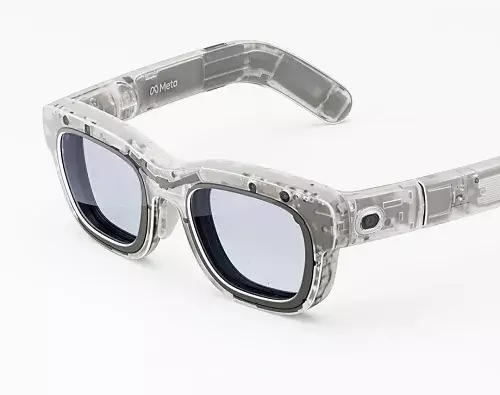In the rapidly evolving landscape of technology, augmented reality (AR) glasses represent one of the most exciting frontiers. Meta, the company formerly known as Facebook, is positioning its upcoming Orion AR glasses as a key player in this field. While their consumer launch is still several years away—targeted for 2027—Meta has provided intriguing insights about their development and the innovations that could redefine how we interact with the digital world.
The Orion AR glasses are touted not merely as a gadget but as a potential paradigm shift in computing, taking their place alongside smartphones as essential tools for everyday life. Meta’s ambitious vision implies a device that integrates seamlessly into our daily activities, eschewing the clunky, cumbersome characteristics historically associated with AR technologies. Interestingly, as Meta’s Reality Labs team works to innovate, it is clear they are committed to overcoming the trade-off between functionality and aesthetics—a challenge that has plagued many tech products before them.
Technological Innovations and Design Challenges
One of the most intriguing aspects of the Orion AR glasses is the introduction of a “puck,” a separate computing unit that tasks itself with managing battery life and processing power. This decoupling allows the AR glasses to maintain a lightweight, stylish profile that could easily fit into modern fashion sensibilities, reminiscent of the successful Ray-Ban smart glasses. However, it’s important to recognize that the frames still appear somewhat bulky and could deter potential users who value sleek designs.
This dynamic between significant advancements and practical usability is critical in Meta’s endeavors. The presence of artificial intelligence technology within AR experiences might enhance functionality, providing users with intuitive interfaces and capabilities. However, achieving an appealing design that doesn’t compromise the experience remains paramount. Aesthetic appeal can significantly influence adoption rates, especially among consumers who prioritize style alongside technology.
Pricing Strategy: Democratizing Technology
Meta’s pricing strategy is another area where they aim to set themselves apart. In stark contrast to Apple’s exorbitant $3,499 VisionPro, Meta’s goal is to offer the Orion AR glasses at a price point comparable to that of a modern smartphone. This approach could facilitate broader adoption among consumers, making advanced AR technology accessible to the average user rather than exclusive tech enthusiasts or enterprise clients. However, this ambition comes with challenges amidst ongoing trade difficulties, especially as many components are sourced internationally.
Zuckerberg’s vision urges a philosophy where technology is not just about selling products, but creating a new connective experience. He envisions a world where AR glasses surpass smartphones as the primary interface for communication, information, and entertainment. This is indeed a noteworthy aspiration, but one must critically assess whether Meta can navigate production costs, feature expansions, and subscription models effectively to make this vision a reality.
Market Dynamics and User Adoption
The competitive landscape is rapidly intensifying. Companies like Apple and Google are also heavily investing in AR, each with their unique approaches and intended user experiences. As Meta continues to craft its identity in this realm, the pressure to innovate is immense. The tech community is keenly watching how consumer expectations evolve alongside these advancements.
Furthermore, consumer adoption is influenced by societal perceptions of AR technology. Already, many individuals exhibit skepticism regarding devices that might intrude on privacy or distract from the immediate environment. Meta must not only launch a product that is technologically superior but also tackle the ancillary issues related to user trust and social acceptance. Building this trust is as critical to the product’s success as the device’s features and affordability.
Future Prospects and User Experiences
At its core, the appeal of Meta’s Orion AR glasses rests on the promise of enhanced user experiences. Imagine walking through a city where digital enhancements provide real-time information about your surroundings, offering directions, historical insights, or personal notifications seamlessly integrated within your field of view. This conception merits excitement, but it also invites scrutiny regarding user engagement and the depth of interaction.
As Meta pushes forward with its development trajectory, the complexities surrounding user interface design, social integration, and ethical considerations will undoubtedly shape the evolution of AR technology. If Meta succeeds in balancing these elements, it could indeed usher in a new era of connectivity that elevates our digital interactions to unforeseen heights.

